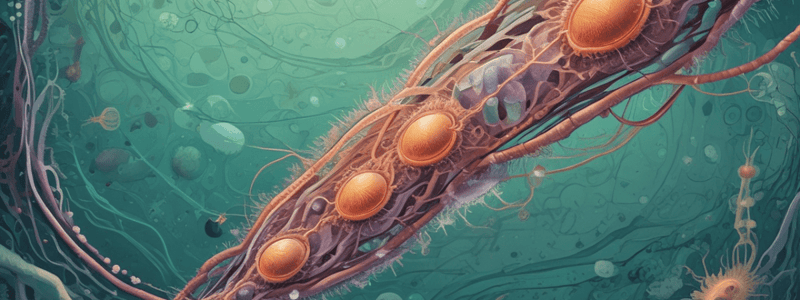Podcast
Questions and Answers
In which year was Giardia lamblia first described?
In which year was Giardia lamblia first described?
- 1859 (correct)
- 1721
- 1681
- 1899
Where does Giardia lamblia inhabit in the human body?
Where does Giardia lamblia inhabit in the human body?
- Large intestine
- Small intestine (correct)
- Stomach
- Esophagus
What is the shape of the trophozoite of Giardia lamblia?
What is the shape of the trophozoite of Giardia lamblia?
- Pear-shaped (correct)
- Round
- Oval
- Rod-shaped
What is the function of the sucking disc in the trophozoite of Giardia lamblia?
What is the function of the sucking disc in the trophozoite of Giardia lamblia?
How many pairs of nuclei are present in the mature cyst of Giardia lamblia?
How many pairs of nuclei are present in the mature cyst of Giardia lamblia?
What is the primary mode of transmission of intestinal flagellates?
What is the primary mode of transmission of intestinal flagellates?
What is the size of the mature cyst of Giardia lamblia?
What is the size of the mature cyst of Giardia lamblia?
How long does it take for excystation to occur after ingestion of cysts?
How long does it take for excystation to occur after ingestion of cysts?
What is the primary site of colonization of intestinal flagellates?
What is the primary site of colonization of intestinal flagellates?
What is the characteristic of the diarrhoea caused by intestinal flagellates?
What is the characteristic of the diarrhoea caused by intestinal flagellates?
What is the purpose of the ELISA test in the diagnosis of intestinal flagellates?
What is the purpose of the ELISA test in the diagnosis of intestinal flagellates?
What is the average incubation period of intestinal flagellates?
What is the average incubation period of intestinal flagellates?
What is the purpose of the Entero test?
What is the purpose of the Entero test?
What is the most common side effect of Metronidazole?
What is the most common side effect of Metronidazole?
Which of the following is NOT a treatment option for giardiasis?
Which of the following is NOT a treatment option for giardiasis?
What is the diagnostic stage of Chilomastix mesnili?
What is the diagnostic stage of Chilomastix mesnili?
How is infection with Chilomastix mesnili typically acquired?
How is infection with Chilomastix mesnili typically acquired?
What is the shape of the cyst of Chilomastix mesnili?
What is the shape of the cyst of Chilomastix mesnili?
What is the characteristic of the motility of Trichomonas hominis?
What is the characteristic of the motility of Trichomonas hominis?
How many anterior flagella and one lateral marginal flagellum are present in Trichomonas vaginalis?
How many anterior flagella and one lateral marginal flagellum are present in Trichomonas vaginalis?
What is the shape of the Trophozoite stage of Trichomonas vaginalis?
What is the shape of the Trophozoite stage of Trichomonas vaginalis?
Which Trichomonas species is found in the oral cavity and is a commensal?
Which Trichomonas species is found in the oral cavity and is a commensal?
What is the habitat of Trichomonas vaginalis in infected females?
What is the habitat of Trichomonas vaginalis in infected females?
What is the characteristic of the discharge in mild vaginitis caused by Trichomonas vaginalis?
What is the characteristic of the discharge in mild vaginitis caused by Trichomonas vaginalis?
What is the typical presentation of Trichomonas vaginalis infection in females?
What is the typical presentation of Trichomonas vaginalis infection in females?
Which of the following is NOT a mechanism by which Trichomonas vaginalis causes infection?
Which of the following is NOT a mechanism by which Trichomonas vaginalis causes infection?
What is the most traditional method of diagnosing Trichomonas vaginalis infection?
What is the most traditional method of diagnosing Trichomonas vaginalis infection?
What is the typical treatment for Trichomonas vaginalis infection?
What is the typical treatment for Trichomonas vaginalis infection?
What is the purpose of the modified Diamond's media in diagnosing Trichomonas vaginalis infection?
What is the purpose of the modified Diamond's media in diagnosing Trichomonas vaginalis infection?
What is the characteristic appearance of the cervix in Trichomonas vaginalis infection?
What is the characteristic appearance of the cervix in Trichomonas vaginalis infection?
What is the primary mechanism of cell-to-cell adhesion in Trichomonas vaginalis?
What is the primary mechanism of cell-to-cell adhesion in Trichomonas vaginalis?
Which of the following symptoms is NOT typically associated with Trichomonas vaginalis infection in females?
Which of the following symptoms is NOT typically associated with Trichomonas vaginalis infection in females?
What is the significance of diffuse vulval erythema in Trichomonas vaginalis infection?
What is the significance of diffuse vulval erythema in Trichomonas vaginalis infection?
Why is microscopic examination of wet film from discharge considered a traditional method of diagnosing Trichomonas vaginalis infection?
Why is microscopic examination of wet film from discharge considered a traditional method of diagnosing Trichomonas vaginalis infection?
What is the purpose of modified Diamond's media in the diagnosis of Trichomonas vaginalis infection?
What is the purpose of modified Diamond's media in the diagnosis of Trichomonas vaginalis infection?
Which of the following tests is used to detect DNA of Trichomonas vaginalis in the discharge?
Which of the following tests is used to detect DNA of Trichomonas vaginalis in the discharge?
What is the significance of strawberry cervix in Trichomonas vaginalis infection?
What is the significance of strawberry cervix in Trichomonas vaginalis infection?
Why is Trichomonas vaginalis infection often misdiagnosed as other sexually transmitted diseases?
Why is Trichomonas vaginalis infection often misdiagnosed as other sexually transmitted diseases?
What is the significance of asymptomatic carriers in Trichomonas vaginalis infection?
What is the significance of asymptomatic carriers in Trichomonas vaginalis infection?
What is the primary advantage of tinidazole over metronidazole in the treatment of Trichomonas vaginalis infection?
What is the primary advantage of tinidazole over metronidazole in the treatment of Trichomonas vaginalis infection?
Flashcards
Giardia lamblia
Giardia lamblia
A flagellate parasite causing intestinal infection, often found in contaminated water.
Trophozoite
Trophozoite
Motile, feeding form of Giardia lamblia and other parasites.
Cyst
Cyst
Protective, dormant form of Giardia lamblia, resistant to environmental factors and crucial for transmission.
Giardia Lamblia Life Cycle
Giardia Lamblia Life Cycle
Signup and view all the flashcards
Intestinal irritation
Intestinal irritation
Signup and view all the flashcards
Traveler's Diarrhea
Traveler's Diarrhea
Signup and view all the flashcards
Steatorrhea
Steatorrhea
Signup and view all the flashcards
Metronidazole
Metronidazole
Signup and view all the flashcards
Chilomastix mesnili
Chilomastix mesnili
Signup and view all the flashcards
Trichomonas hominis
Trichomonas hominis
Signup and view all the flashcards
Trichomonas vaginalis
Trichomonas vaginalis
Signup and view all the flashcards
Urogenital Tract
Urogenital Tract
Signup and view all the flashcards
Vaginitis
Vaginitis
Signup and view all the flashcards
Strawberry cervix
Strawberry cervix
Signup and view all the flashcards
ELISA
ELISA
Signup and view all the flashcards
Microscopic examination
Microscopic examination
Signup and view all the flashcards
Wet mount
Wet mount
Signup and view all the flashcards
Tinidazole
Tinidazole
Signup and view all the flashcards
Furazolidone
Furazolidone
Signup and view all the flashcards
Laboratory Diagnosis
Laboratory Diagnosis
Signup and view all the flashcards
Incubation Period
Incubation Period
Signup and view all the flashcards
Study Notes
Flagellates
Intestinal Flagellates
- Giardia lamblia:
- Discovered by Leeuwenhoek in 1681
- High prevalence in tropics and sub-tropical regions with poor sanitation
- Inhabits duodenum and upper part of jejunum
- Two forms: Trophozoite and Cyst
- Trophozoite:
- Pear-shaped with rounded anterior and pointed posterior end
- Dorsal surface is convex, ventral surface has a sucking disc
- Lacks mitochondria
- Bilaterally symmetrical with:
- One pair of nuclei
- One pair of axostyles
- One pair of parabasal bodies
- Four pairs of flagella
- Four pairs of blepharoplasts
- Cyst:
- Oval in shape, measuring 11-14 μm × 7-10 μm
- Two pairs of nuclei
- Transmission stage or infective form
- Life cycle:
- Infection occurs through ingestion of cysts in faecally contaminated water or food
- Excystation occurs in the duodenum within 30 minutes
- Trophozoites multiply by binary fission and colonize in the duodenum and upper part of jejunum
- Encystation occurs in the colon
- Pathogenicity:
- Incubation period: 1-4 weeks (average, 10 days)
- Causes duodenal and jejunal irritation, duodenitis, and jejunitis
- May cause traveller's diarrhoea
- Symptoms:
- Dull epigastric pain
- Chronic diarrhoea of steatorrhoea type
- Voluminous, foul-smelling, and contains large amounts of mucus and fat
- No blood
- Laboratory diagnosis:
- General Stool Examination (GSE) to identify cysts in formed stool and trophozoites in diarrhoeal stool
- Enzyme-linked immunosorbent assay (ELISA) to detect anti-Giardia antibodies in patients' serum
- Entero test (string test) to aspirate specimens from the upper intestine
- Treatment:
- Metronidazole
- Tinidazole
- Furazolidone (popular option for children)
Non-Pathogenic Intestinal Flagellates
- Chilomastix mesnili:
- Occurs with other parasite infections
- Inhabits human cecum and/or colon
- Two stages: Trophozoite and Cyst
- Trophozoite:
- Motility: Stiff, rotary
- One nucleus
- Flagella: 3 anterior, 1 in cytostome
- Cyst:
- Nucleus: Mature = 1
- Cytostome: Lemon-shaped
- Life cycle:
- Infection occurs through ingestion of cysts in contaminated water or food
- Excystation releases trophozoites in the large intestine
- Trichomonas hominis:
- Motility: Jerky, rapid
- One nucleus
- Flagella: 3-5 anterior, posterior
- Features: Undulating membrane entire length
- Inhabits large intestine
- Genus Trichomonas:
- Has 3 distinct species:
- T. hominis (non-pathogenic, inhabits large intestine)
- T. tenax (commensal, inhabits oral cavity)
- T. vaginalis (Urogenital pathogenic flagellate)
- Has 3 distinct species:
Genital Flagellates
- Trichomonas vaginalis:
- Common sexually transmitted protozoon
- Geographical distribution: Worldwide
- Morphology of Trophozoite stage:
- Average size: 7-23 μm × 5-15 μm
- Pear-shaped
- Single vesicular nucleus
- Anteriorly and a small antero-lateral cytostome
- Thin axostyle midway crossed by thick parabasal body
- Lacks mitochondria
- Four anterior free flagella and a lateral marginal flagellum with an undulating membrane
- No cyst stage
- Habitat:
- In the vagina and urethra of infected females
- In the urethra and prostate of infected males
- Pathogenicity:
- Mild vaginitis with discharge
- Male patients: mild or asymptomatic infections
- Itching and discomfort inside penile urethra, especially during urination
- Symptoms:
- In female:
- Sloughing of squamous epithelial cells of vagina and urethra
- Asymptomatic (50%): Profuse odorous discharge, burning, itching, frequency of urination, and dysuria
- On examination: Excessive discharge, diffuse vulval erythema, and vaginal wall inflammation (Strawberry cervix)
- In female:
- Laboratory diagnosis:
- Microscopic examination of wet film from discharge
- Culture of discharge (modified Diamond's media)
- Detection of T. vaginalis antigen in discharge by:
- Enzyme immunoassay
- Direct fluorescent antibody test
- Detection of DNA of the parasite by Molecular techniques (PCR)
- Treatment:
- Metronidazole, 2 g oral single dose
- Tinidazole, 2 g oral single dose
Studying That Suits You
Use AI to generate personalized quizzes and flashcards to suit your learning preferences.




